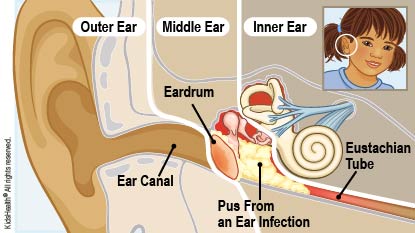A middle ear infection (often just called "ear infection") is a buildup of pus (infected fluid) behind the eardrum. Some kids get repeated (also called recurrent) middle ear infections. This can affect their hearing and speech development. Treatments usually can help kids get fewer ear infections.

Follow your health care provider's instructions for:
- Giving your child antibiotics, if needed.
- Giving acetaminophen (Tylenol® or a store brand) or ibuprofen (Advil®, Motrin®, or a store brand) for pain or fever. Follow the package directions for how much to give and how often. Don't give ibuprofen to babies under 6 months old. Don't give aspirin to your child because it has been linked to a rare but serious illness called Reye syndrome.
- Making any follow-up appointments with an ear, nose, and throat specialist.
- When to follow up.
To reduce the risk of ear infections:
- Don't smoke or allow others to smoke around your child. For help quitting, call 800-QUIT-NOW (800-784-8669) or visit smokefree.gov.
- Breastfeed your baby, if possible. If bottle-feeding, hold your baby at an angle (so the head is above the belly). And don't give your baby a pacifier after 6 months of age.
- Make sure your child gets all recommended vaccines (shots).
Ear infections aren't contagious (spread to others), but a cold or other virus that can cause an ear infection is contagious. To prevent spreading colds and other viruses:
- Teach all family members to wash their hands well and often. They should use soap and water and scrub their hands for at least 20 seconds, rinse, and dry thoroughly. If soap and water aren't available, a hand sanitizer with at least 60% alcohol can be used.
- Help your child avoid other people who are sick, if possible.

Your child:
- Has new or worsening ear pain
- Still has pain or fever after 2–3 days
- Has fluid or blood coming from the ear
- Isn't drinking or has signs of dehydration (not enough water in the body) such as a dry or sticky mouth, sunken eyes, peeing less often, darker than usual pee, or crying with little or no tears
- Vomits more than a few times in 24 hours
- Has trouble hearing that doesn't go away within two weeks
You know your child best. If your child has symptoms that worry you or seems very sick, call your health care provider.

What causes middle ear infections? The middle ear is connected to the back of the throat by the eustachian tube. Colds and allergies can make the eustachian tube swell or get blocked. This can lead to a buildup of mucus in the middle ear. Germs (viruses or bacteria) that spread from the nose or throat grow in the blocked mucus, causing a middle ear infection.
What is the treatment for repeated middle ear infections? For kids who get a lot of ear infections, health care providers might suggest:
- Antibiotic prophylaxis: taking a small dose of oral (by mouth) antibiotics every day, even when the child feels well
- Ear tube surgery: placing tiny plastic tubes in the eardrum to let the fluid drain out
- Other surgery: removing the adenoids and/or tonsils if they're enlarged and blocking the eustachian tube
Are middle ear infections contagious (spread from person to person)? Middle ear infections are not contagious, but a cold or other virus that can cause an ear infection is contagious. To prevent the spread of viruses and other germs, teach family members to wash their hands well and often and stay away from people who are sick, if possible.




